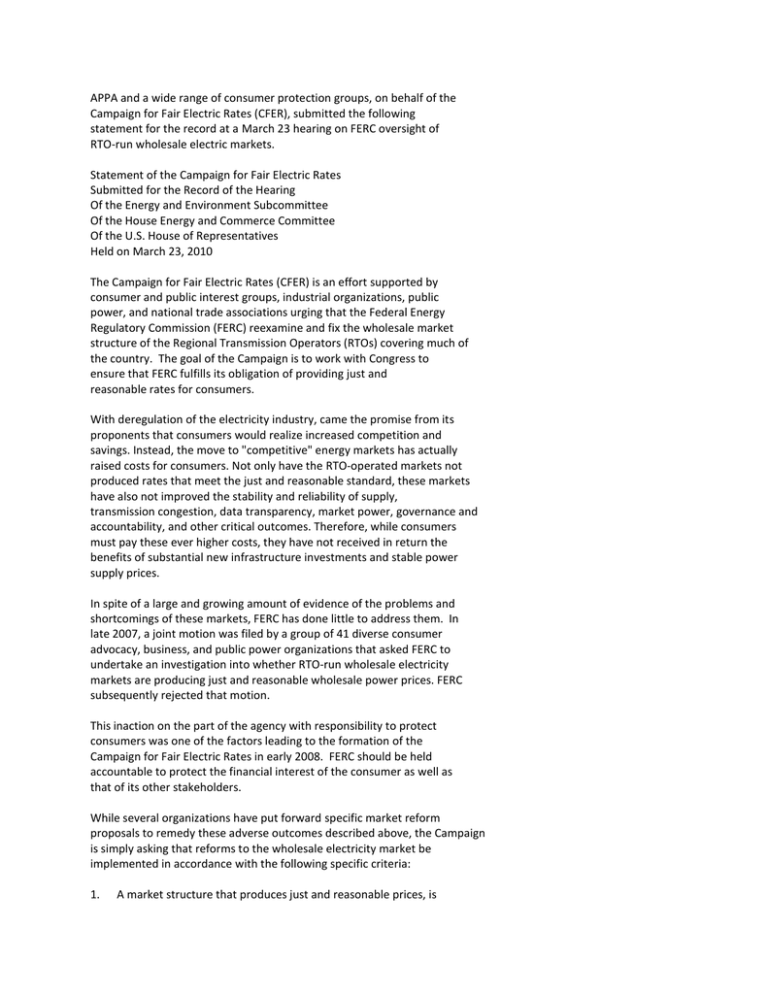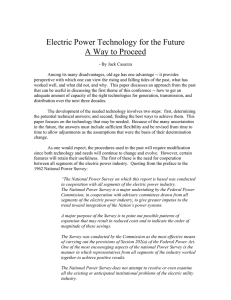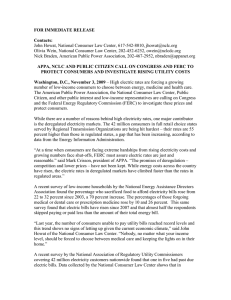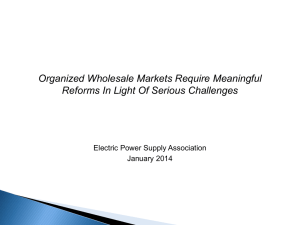APPA and a wide range of consumer protection groups, on... Campaign for Fair Electric Rates (CFER), submitted the following
advertisement

APPA and a wide range of consumer protection groups, on behalf of the Campaign for Fair Electric Rates (CFER), submitted the following statement for the record at a March 23 hearing on FERC oversight of RTO-run wholesale electric markets. Statement of the Campaign for Fair Electric Rates Submitted for the Record of the Hearing Of the Energy and Environment Subcommittee Of the House Energy and Commerce Committee Of the U.S. House of Representatives Held on March 23, 2010 The Campaign for Fair Electric Rates (CFER) is an effort supported by consumer and public interest groups, industrial organizations, public power, and national trade associations urging that the Federal Energy Regulatory Commission (FERC) reexamine and fix the wholesale market structure of the Regional Transmission Operators (RTOs) covering much of the country. The goal of the Campaign is to work with Congress to ensure that FERC fulfills its obligation of providing just and reasonable rates for consumers. With deregulation of the electricity industry, came the promise from its proponents that consumers would realize increased competition and savings. Instead, the move to "competitive" energy markets has actually raised costs for consumers. Not only have the RTO-operated markets not produced rates that meet the just and reasonable standard, these markets have also not improved the stability and reliability of supply, transmission congestion, data transparency, market power, governance and accountability, and other critical outcomes. Therefore, while consumers must pay these ever higher costs, they have not received in return the benefits of substantial new infrastructure investments and stable power supply prices. In spite of a large and growing amount of evidence of the problems and shortcomings of these markets, FERC has done little to address them. In late 2007, a joint motion was filed by a group of 41 diverse consumer advocacy, business, and public power organizations that asked FERC to undertake an investigation into whether RTO-run wholesale electricity markets are producing just and reasonable wholesale power prices. FERC subsequently rejected that motion. This inaction on the part of the agency with responsibility to protect consumers was one of the factors leading to the formation of the Campaign for Fair Electric Rates in early 2008. FERC should be held accountable to protect the financial interest of the consumer as well as that of its other stakeholders. While several organizations have put forward specific market reform proposals to remedy these adverse outcomes described above, the Campaign is simply asking that reforms to the wholesale electricity market be implemented in accordance with the following specific criteria: 1. A market structure that produces just and reasonable prices, is fair to all market participants, and shares the benefits of factors such as fuel diversity and operational efficiencies equitably between consumers and suppliers. 2. Improved and more timely data transparency and accountability to consumers. 3. A consumer-focused system that assures reliability and capacity growth to meet their future electricity needs. While we still believe that a comprehensive investigation into these markets would be the best way to illuminate possible solutions and address fundamental market reforms, the Campaign recognizes that a number of immediate steps can be taken to provide consumers some relief. One of these steps is to provide greater transparency on generator offers to sell power in the RTO markets (often known as "bid data"), the identities of specific generators making those bids, and the actual costs of producing that power. Data Transparency In addition to a fundamentally flawed market design, one of the problems contributing to the higher price of electricity in RTO regions is that the RTO-run centralized wholesale electricity markets are operated by the RTO under computer-facilitated auction mechanisms, the details of which are generally known only to the RTOs and their market monitors. Many of the inputs into the auction program, including generators' offers to sell power, are not released for months and only then in masked form. The actual costs for the generators to produce the power they sell, and whether their bids to sell power are "mitigated" to address market power concerns, are also known only to the RTOs and their market monitors. Unfortunately, the RTO-operated markets in the United States are among the most conservative in their release of data as compared to other countries with similar market structures. While the majority of the RTOs in the U.S. post bid data only in masked form and after a delay of at least three months, markets in some other countries are more transparent. For example, the Australian electricity market requires information disclosure the next operating day and this level of transparency is viewed as a positive aspect of the market design, including by private generators. The timely release of market bid data with generating units identified, along with the actual operating costs of those units, would greatly discourage irregular pricing and market manipulation. However, opponents of transparency in the wholesale electricity markets, primarily generators selling into the market, often claim that such data availability would encourage potential collusion among market participants. This theory contradicts the results seen in other typical commodity markets which encourage accurate and timely public reporting of prices. When bidders know that their behavior is transparent, there should be less collusion and market manipulation. Decreasing the delay in publishing and unmasking the data should also make it easier to spot potential problems earlier. Even though FERC has the authority to require the release of the bid data on a next day basis, as well as the generators' identities and costs, the agency has declined to do so. In a recent order, FERC instead chose to give the RTOs flexibility to determine whether to release data in a shorter time frame than three months (or a longer time of four months). It also left to the RTOs to propose whether to reveal bidder identities, noting that they may "have perfectly rational reasons to prefer delaying the release of offer and bid data, and to mask identities"-the question "what are those reasons" needs to answered and scrutinized. FERC needs to take a more active role in encouraging transparency of bid and generator cost data, to ensure consumers are paying "just and reasonable" rates and to protect against possible market manipulation. Conclusion The Campaign for Fair Electric Rates and its allies, listed below, appreciate the opportunity to submit this statement. As history has indicated, problems in the wholesale electricity markets are not self correcting. Numerous reports and recent press regarding episodes of highly questionable market participant behavior show that the lack of transparency in the wholesale electricity market has not served consumers well. While increased data transparency is only part of the solution, it could have a significant impact on the competitiveness of these markets and the prices paid by electricity consumers in RTO regions. On behalf of electricity consumers, the Campaign and its members stand ready to assist in that effort in any way we can. CFER Members and Allies Supporting the Statement: 1. American Forest and Paper Association 2. American Homeowners Grassroots Alliance 3. American Municipal Power 4. American Public Power Association 5. Association of Businesses Advocating Tariff Equity 6. Blue Ridge Power Agency 7. Citizen Power 8. Coalition of Midwest Transmission Customers 9. Consumer Federation of America 10. Consumers Union 11. Electricity Consumers Resource Council (ELCON) 12. Illinois Citizens Utility Board (CUB) 13. Indiana Industrial Energy Consumers, Inc. 14. Industrial Energy Users - Ohio 15. Kennebunk Light & Power District 16. Industrial Energy Consumers of America 17. Iowa Association of Municipal Utilities 18. Maryland Public Interest Research Group (PIRG) 19. Michigan Municipal Electric Association 20. Multiple Intervenors 21. Municipal Electric Utilities of Wisconsin 22. National Consumer Law Center, on behalf of our low-income clients 23. NEPOOL Industrial Customer Coalition 24. New York Association of Public Power 25. Northeast Public Power Association 26. 27. 28. 29. 30. 31. 32. 33. 34. 35. Ohio Hospital Association Ohio Municipal Electric Association Ohio Partners for Affordable Energy PJM Industrial Customer Coalition Portland Cement Association Public Citizen Public Power Association of New Jersey Public Utility Law Project of New York, Inc. (PULP) West Virginia Energy Users Group Wisconsin Industrial Energy Group



